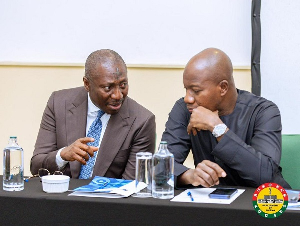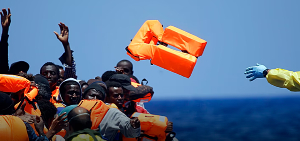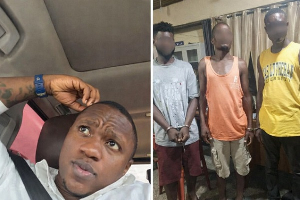The above headline is a statement purported to have issued and read on behalf of the regent of the Mamprusis community in Bawku Alhaji Ibrahim Adam Zangbeogo and reported by GNA on April10 2010. In the said statement, the Mamprusis elders sought to lay blame for the escalating violence in Bawku on the inability to curtail the smuggling of sophisticated weapons into the municipality. They further stated that Bawku should be considered experimental and if we fail to control the influx of arms and their usage there, the problem has the potentials to pervert every crevice of the Ghanaian society in totality that in the near future the consequences can be any one’s guess.
But what he failed to do was to also outline the part they the leaders themselves are expected to play in order to bring the needed peace in Bawku.But before I do that for them I would like to first of all take readers through the brief history of the Bawku crisis.
As may be aware, our colonial masters at certain point in time had serious problems with the administration of Ghana known as Gold Coast by then. What they therefore decided to do was to rule the country through chiefs, a system popularly known as indirect rule. Because Mamprugu, which currently covers areas, like Nalerigu, Walewale, Gambaga, etc in present day Northern region was closer to the present day Upper east, certain traditional areas including Bawku were placed under the ruler ship of the Nayiri. The reason for doing that was for ease of administration. It is also argued that it was because the Mamprusi kingdom was the most organised one at that place during that time. The Kusasis who later realised that the Mamprusis were becoming more and more powerful as a result of this administrative system raised objection to that phenomenon and refused the idea of taking instructions from the colonial masters through the Mamprusis. The Mamprusi community that moved to settle in Bawku as result of the earlier arrangement continued to regard themselves as royals of Bawku whilst the Kusasis also rejected them as such.
This trend continued until the colonial masters sensing an impending catastrophe in Bawku in some years to come and also as part of preparing Ghana for independence decided to set up a commission of inquiry to look into such claims and counter claims. In the early 1950s, this commission came out with its findings confirming the Kusasis’ claim that Bawku is for them. As part of the recommendations made before Ghana became independent it was stated that any Mamprusi who arrogated to himself the status of a chief within the area should be disregarded. These findings were fully implemented by Ghana’s first president Osagyefo Dr Kwame Nkrumah.
Unfortunately, the Mamprusis in Bawku rejected these findings and took a swipe at Nkrumah for implementing them. They became his sworn enemies and in fact it has been widely reported in the history of Bawku that they contributed in no small way towards the bombing of Nkrumah at Kulugungu in Bawku east municipality.
The Mamprusis then resorted to a legal action but lost to the Kusasis in 1958 appeals court ruling. They resurrected the case in 2003 at the Supreme Court but again lost it to the Kusasis. Not satisfied by the 2003 Supreme Court ruling, a group of Mamprusi youth on one Bawku market day went and barricaded themselves under mango trees and then ambushed and killed five Kusasis and wounded nineteen others. This resulted in clashes the following day.
Again on 31st December 2007, when the Kusasis were celebrating their annual Samanpiid festival, the Mamprusis out of greed and anguish ambushed and killed three Kusasis and wounded another eight and on 1st January 2008, fighting again erupted between the two sides. The then president Kufuor invited both factions to the Castle and prevailed on them to cease hostilities. However, three days later the Manprusis stormed a mosque and gunned down one Kusasi opinion leader by name Alhaji Karim Oga.This further resulted in more clashes.
Few weeks later a group of Mamprusis disguised themselves in camouflage military uniform and entered four Kusasi houses during curfew hours and massacred sixteen women and children in clear violation of the UN war crime convention. This infuriated most Kusasi youth thereby compelling most of them to also take entrenched positions hence the escalation of the conflict throughout 2008 and to date.
The issue in Bawku is not about government not taking measures to stop the smuggling of arms as alleged by the Mamprusis elders but rather their failure as leaders of their community to rein in on all the extremists elements in their midst.
Since it is a case, which has had Supreme Court settlement, any individual who is not satisfied with the court’s verdict should be advised to appeal against the ruling and not to resort to violence. Everybody should be made to understand that Bawku is not a jungle and therefore the rule of law must be respected.
As a Kusasi and someone who is much concerned with the situation in Bawku, I have had the privilege to talk to most of my fellow Kusasis and can bet to say that about 99.99% of them are absolutely against the recurrent conflict. They only come out to defend themselves when attacked. It is for this reason that the Kusasis are still a party to the Bawku peace council unlike the Mamprusis who have withdrawn from it
I wish therefore to by this write-up appeal to the Mamprusis leaders to do everything on their part to end the escalating violence in Bawku. The onus is on them to do that. It is also in their interest to do so. They can do that by returning to the peace council without delay. They should also make it clear to their youth that they stand to lose most by not renouncing violence. After all the Kusasis who currently control more than 99% of the traditionally area cannot be at all defeated through militancy.
Source: Akudugu Alhassan
Phone: 0244477639
Opinions of Friday, 16 April 2010
Columnist: Akudugu, Alhassan














